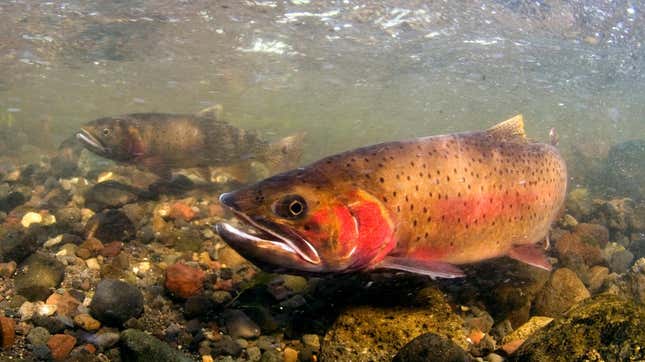
If you’re planning to go fishing in Yellowstone National Park this summer, you better head out there in the early morning, because starting on Saturday, the park will be closing all fishing in rivers and streams each day from 2 p.m. until sunrise.
The park said these new fishing hours, which will be in effect until further notice, will help protect its native fish population. This summer, those fish have been under serious stress due to hot water temperatures and low stream flows, both symptoms of the megadrought. Extreme heat waves that have rippled across the West this summer, worsening conditions even further.
In a statement, park officials said temperatures in some of Yellowstone creeks’ and rivers have surpassed 68 degrees Fahrenheit (20 degrees Celsius) and that water levels are approaching “approaching historic lows.” Since things aren’t expected to exactly get chilly any time soon—highs in the park could be in the mid-80s this weekend and another heat dome is building—these circumstances are probably not going to improve much for the time being.
Yellowstone National Park has a catch and release regulations for all native fish, meaning the fish must be returned to the streams unharmed. But this, officials say, can still put the already stressed-out fish under even more duress, so it’s best to avoid removing them from the water during the hottest part of the day.
Yellowstone is home to a number of native trout and other fish. In addition to climate threats like heat and drought, which can make it difficult for fish to find food and travel, these populations face additional threats in the form of encroaching invasive species and spread of diseases. This isn’t just bad news for the fish themselves. It can also throw off food chains. Studies show that as cutthroat trout populations in the park dwindled, populations of river otters, which eat cutthroat trout, declined as well.
It’s not just Yellowstone’s fish populations that have been having a hard time in the West this summer. This week, Montana instated new fishing restrictions because low river levels and fish die-offs have threatened populations of trout, especially the rainbow and brown trout. In California, officials hatched a plan to drive 17 million chinook salmon from hatcheries in the Central Valley to the sea because the hot and dry conditions made it untenable for them to swim downstream. Despite these efforts, officials have warned that nearly every young chinook along the Sacramento River could perish anyway. The state of Colorado has asked that people refrain from fishing along a 120-mile (193-kilometer) stretch of the Colorado River due to, you guessed it, low river levels and warmer water. In Utah, lawmakers have taken the opposite and much bleaker approach, doubling the catch limit for trout since many are expected to die due to low water levels anyway. The West’s sad state of fishing affairs is a reminder that climate change’s impacts are manifold, and that the rising heat is upending even one of summer’s most relaxing pasttimes.
Lakes in the park, including Yellowstone Lake, will still be open for fishing from sunrise to sunset as usual. But officials advise that all visitors stick to fishing during the day’s cooler hours and also put caught fish back into the water quickly and gently so they don’t get too exhausted.
“Your cooperation will protect the park’s fisheries and may preclude the need to prohibit fishing at all times of the day on some rivers and streams if conditions worsen,” Yellowstone said in a statement.